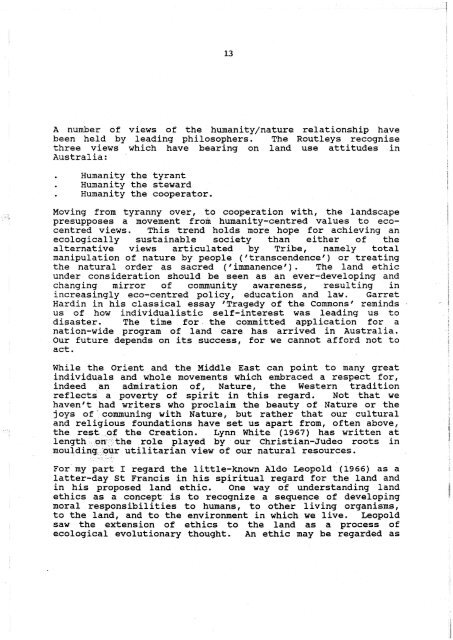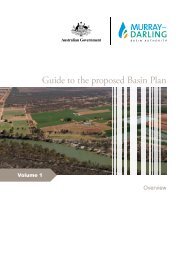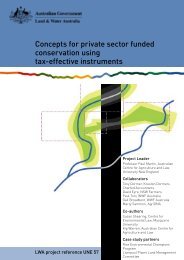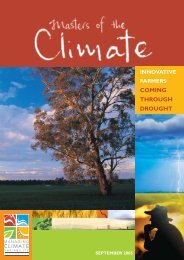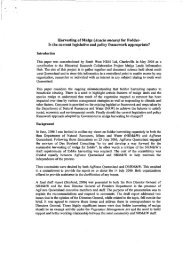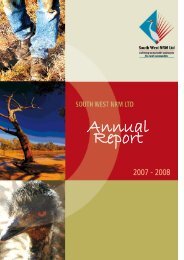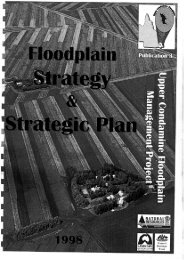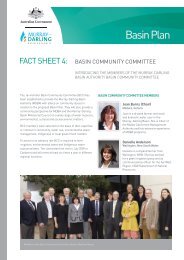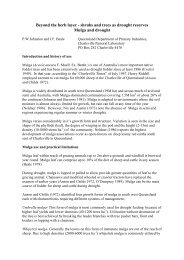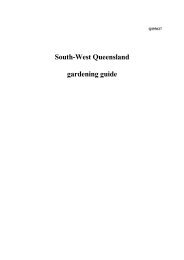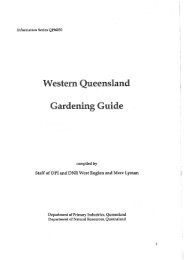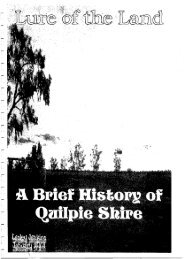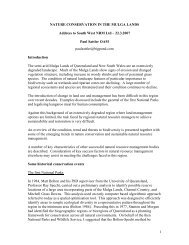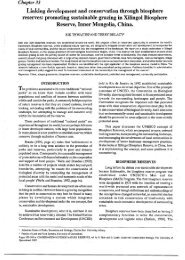soil-conservation-people-religion-and-land.pdf - South West NRM
soil-conservation-people-religion-and-land.pdf - South West NRM
soil-conservation-people-religion-and-land.pdf - South West NRM
You also want an ePaper? Increase the reach of your titles
YUMPU automatically turns print PDFs into web optimized ePapers that Google loves.
A number of views of the humanity/nature relationship have<br />
been held by leading philosophers. The Routleys recognise<br />
three views which have bearing on l<strong>and</strong> use attitudes in<br />
Australia:<br />
. Humanity the tyrant<br />
. Humanity the steward<br />
. ~umanity the cooperator.<br />
Moving from tyranny over, to cooperation with, the l<strong>and</strong>scape<br />
presupposes a movement from humanity-centred values to ecocentred<br />
views. This trend holds more hope for achieving an<br />
ecologically sustainable society than either of the<br />
alternative views articulated by Tribe, namely total<br />
manipulation of nature by <strong>people</strong> ('transcendence') or treating<br />
the natural order as sacred ('immanence'). The l<strong>and</strong> ethic<br />
under consideration should be seen as an ever-developing <strong>and</strong><br />
changing mirror of community awareness, resulting in<br />
increasingly eco-centred policy, education <strong>and</strong> law. Garret<br />
Hardin in his classical essay 'Tragedy of the Commons' reminds -<br />
us of how individualistic self-interest was leading us to<br />
disaster. The time for the committed application for a<br />
nation-wide program of l<strong>and</strong> care has arrived in Australia.<br />
Our future depends on its success, for we cannot afford not to<br />
act.<br />
While the Orient <strong>and</strong> the Middle East can point to many great<br />
individuals <strong>and</strong> whole movements which embraced a respect for,<br />
indeed an admiration of, Nature, the <strong>West</strong>ern tradition<br />
reflects a poverty of spirit in this regard. Not that we<br />
haven't had writers who proclaim the beauty of Nature or the<br />
joys of'communing with Nature, but rather that our cultural<br />
<strong>and</strong> religious foundations have set us apart from, often above,<br />
the rest of the Creation. Lynn White (1967) has written at<br />
length . on- the role played by our Christian-Judeo roots in<br />
moulding aur utilitarian view of our natural resources.<br />
. -<br />
For my part I regard the little-known Aldo Leopold (1966) as a<br />
latter-day St Francis in his spiritual regard for the l<strong>and</strong> <strong>and</strong><br />
in his proposed l<strong>and</strong> ethic. One way of underst<strong>and</strong>ing l<strong>and</strong><br />
ethics as a concept is to recognize a sequence of developing<br />
moral responsibilities to humans, to other living organisms,<br />
to the l<strong>and</strong>, <strong>and</strong> to the environment in which we live. Leopold<br />
saw the extension of ethics to the l<strong>and</strong> as a process of<br />
ecological evolutionary thought. An ethic may be regarded as


